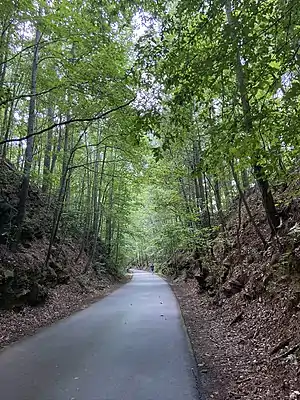Silver Comet Trail
The Silver Comet Trail is a rail trail in west-northwestern Georgia.
| Silver Comet Trail | |
|---|---|
  Top and bottom: the Silver Comet Trail in Cobb County, the trail near Rockmart | |
| Length | 61.5 mi (99 km) |
| Location | Northwest Georgia - Northeast Alabama |
| Designation | |
| Trailheads | Smyrna/Chief Ladiga Trail |
| Use | Bicycle, Running, Hiking, Dogs on leash, Horseback Riding, Roller/Inline Skating, and Skateboarding |
| Hiking details | |
| Season | Year round |
| Sights | Brushy Mt. Tunnel |
| Surface | paved |
| Right of way | Seaboard System rail line |
Route

The Silver Comet Trail is named for the Silver Comet passenger train that traversed the same route from 1947 to 1969.[1] It begins in Smyrna, Georgia, runs west through Cobb, Paulding and Polk counties, and continues as Alabama's Chief Ladiga Trail at the state line.
The Silver Comet and Chief Ladiga trails join to form one continuous 94-mile (151 km) trail from Smyrna, Georgia to Anniston, Alabama, which together form the second longest paved rail trail in the U.S.[2][3]
U.S. Bicycle Route 21 follows a 52-mile (84 km) portion of Silver Comet Trail from Cedartown to the east end of the trail.[4] The trail is locally known as an ideal destination for bikers and runners to train or relax.
History
In 1947, the Silver Comet was introduced by the Seaboard Air Line Railroad (SAL) during the height of passenger rail use. Due to declining ridership, the Silver Comet was downgraded in the 1960s, losing its sleeper-lounger cars. In 1969, the Silver Comet was downgraded again and finally discontinued in June of that year, by SAL successor Seaboard Coast Line (SCL).
By 1986 SCL had gradually merged with several nearby railroads, forming the Seaboard System, which had become CSX Transportation by July 1987. CSX abandoned 36 miles (58 km) of the former Silver Comet route from Cobb County through Paulding and Polk counties in 1989. In 1992, the Georgia Department of Transportation initially purchased the former roadbed for future use as a high-speed transit route, but later that year, Ron Griffith, Director of Cobb County Parks, requested a lease agreement between the county and the Georgia DOT to use the rail line as a multi-use trail. The Cobb County Board of Commissioners approved the multi-use trail plan in November.
Construction began in July 1998, with the initial section between Nickajack Creek and Hicks Road opening by that November.
The former SAL/SCL right of way is rail banked. This means at any time in the future, if rail traffic increases to the point where an old line exists, it could be purchased and track put back down and the right of way, would thus become a Class 1 railroad again. The former SAL/SCL line is 78 miles shorter than the line CSXT now uses, the former ACL and Atlanta & West Point lines which runs well south of the former SAL/SCL line.
In September 2019 the James M. Cox Foundation gave $6 Million to the PATH Foundation which will connect the Silver Comet Trail to The Atlanta Beltline which is expected to be completed by 2022. Upon completion, the total combined interconnected trail distance around Atlanta for The Atlanta BeltLine and Silver Comet Trail will be the longest paved trail surface in the U.S. totaling about 300 Miles (480km).
Geology
In Paulding County, the Silver Comet Trail crosses over the Allatoona Fault; where the trail intersects the fault in the vicinity of Willow Springs Road, the fault serves to divide the distinctive Eastern Blue Ridge rocks from those that most characterize the Western Blue Ridge Province. One rock formation of particular note in Paulding County is the Ordovician-age Pumpkinvine Creek Formation (PCF), primarily composed of metamorphosed volcanic rocks thought to have originated out in the now-vanished, ancient ocean that geologists generally refer to as Iapetus.[5]
The meta-volcanic rocks of the PCF are believed to be remnants of the sort of so-called "accreted terranes" described above, and exposures of PCF rocks can be found on the Silver Comet Trail near the Allatoona Fault.
See also
| Wikimedia Commons has media related to Silver Comet Trail. |
- Chief Ladiga Trail
- Nathan Dean Complex and Park
References
- "Polk County". Calhoun Times. 1 September 2004. p. 105. Retrieved 26 April 2015.
- Path Foundation Newsletter Archived February 18, 2007, at the Wayback Machine
- Longest Trails: Longest Paved Trail And Longest Ice Skating Trail, American Trails, 2018-09-09
- DiGioia, Katelyn (2015-08-11), AASHTO Application for Designation of a U.S. Bicycle Route: Georgia USBR No. 21 (PDF)
- Holm-Denoma, Christopher S., 2006, Florida State University Ph.D. dissertation entitled: CHARACTERIZATION OF PALEOZOIC TERRANES AND TERRANE ACCRETION AT THE SOUTHEASTERN MARGIN OF LAURENTIA: GEORGIA AND ALABAMA APPALACHIANS
External links
- The Silver Comet Trail in Cobb County, Georgia (official site)
- Silver Comet Trail directions, facts, maps, parking, photos, videos
- Information about the Silver Comet Trail at the PATH Foundation
- PATH Foundation newsletter with construction updates
- Information about the Silver Comet Trail at TrailExpress
- Silver Comet Trail Map (google mashup)
- Silver Comet Trail Page at RailsToTrails.us
- Silver Comet Trail at Georgia's Railroad History and Heritage
- Murder On The Silver Comet Trail by Charlotte Fairchild promoting safety awareness
- Polk County Chamber of Commerce video highlighting the Trail